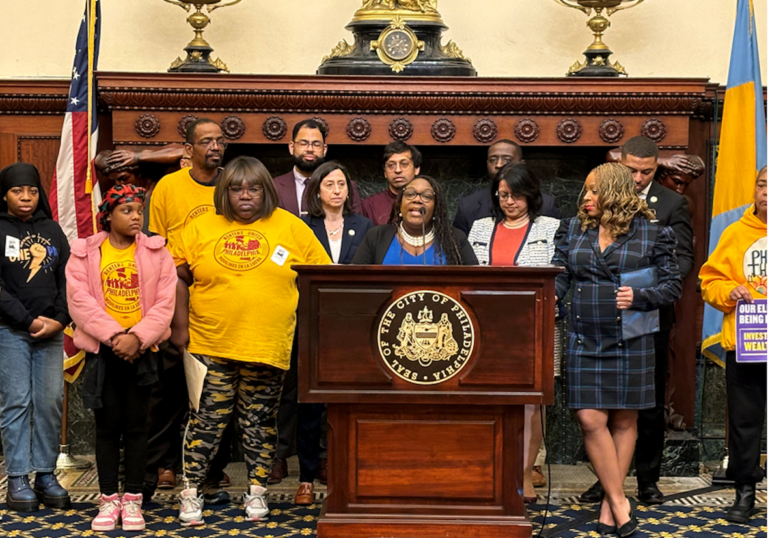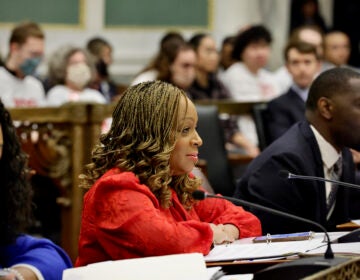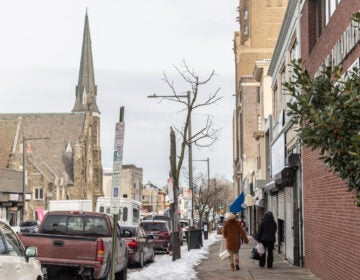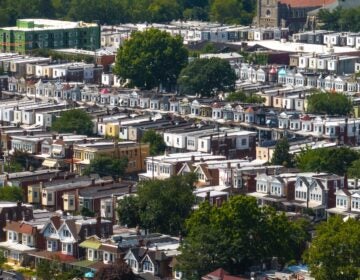Philly lawmakers seek to save more renters from being evicted: ‘This is an emergency’
The “Our Philly Neighborhoods” campaign also calls for home repair funding and an expansion of the pool of residents who can freeze their taxes.

Councilmember Kendra Brooks discusses the eviction diversion program as part of the Our Philly Neighborhoods platform. (Courtesy of Councilmember Brooks' office)
Have a question about Philly’s neighborhoods or the systems that shape them? PlanPhilly reporters want to hear from you! Ask us a question or send us a story idea you think we should cover.
A group of Philadelphia lawmakers wants to make permanent the city’s heralded Eviction Diversion Program, a pandemic-inspired initiative credited with keeping thousands of residents in their homes while reducing eviction filings.
The free program, which compels landlords to try to settle tenant disputes outside of court, is scheduled to expire in June. A bill set to be introduced on Thursday would remove the sunset provision, authorizing the program to operate in perpetuity if the measure becomes law.
To date, more than 7,000 landlord-tenant pairs have participated in mediation during various versions of the program, according to the city. Approximately 70% of them have reached an agreement without an eviction filing, which often makes it harder for tenants to find safe and affordable housing in the future regardless of the outcome.
The majority of those cases have involved Black women.
“This is an emergency here in Philadelphia and the great news is we have a program that’s working. So let’s keep that up. Let’s make sure that we keep this Eviction Diversion Program going,” said City Councilmember Rue Landau during a news conference on Wednesday.
Landau will co-introduce the measure with Councilmembers Kendra Brooks, Nicolas O’Rourke and Jamie Gauthier. The bill is part of a platform aimed at helping Philadelphia renters and homeowners with low incomes to keep a roof over their heads amid a housing affordability crisis.
Dubbed “Our Philly Neighborhoods,” the campaign also calls for $100 million for the Targeted Financial Assistance program over the next two years. Under the initiative, landlords can receive a one-time payment to cover a tenant’s total backrent plus one month’s rent. To qualify, landlords and tenants must have both made “reasonable efforts” to complete the Eviction Diversion Program.
To date, nearly 3,800 landlords have received assistance with an average payment amount of approximately $4,000, according to Mayor Cherelle Parker’s five-year plan.
Since January 2023, an additional 4,000 landlord-tenant pairs were able to avoid eviction — without mediation — as a result of TFA, a city spokesperson said.
“Rental assistance and eviction diversion go hand and hand. That’s why we’re pushing really hard for this money to be available,” said Brooks.
Over the past two years, the TFA program has allocated $30 million for rental assistance. Parker’s first budget proposal does not include any new money from the general fund for the program in the fiscal year beginning July 1, meaning the $100 million request would need to be negotiated.
“Our Philly Neighborhoods” also seeks to freeze property taxes for homeowners with low incomes, automate enrollment in tax exemption programs, and expand home repair programs offered by the city.
More than half of all housing units in Philadelphia were built before 1950 and nearly three-quarters of them were built before 1960, according to U.S. Census data.
Geneva Williams, who has been hospitalized as a result of persistent mold in her 100-year-old home, said seniors living on fixed incomes are especially in need of “robustly” funded home repair programs.
“They spend their whole life trying to keep their home, pass it onto their family for generational wealth, and then they find out that their family members that receive their home cannot afford the repairs and the house ends up being lost,” said Williams during the news conference.
The city has a menu of home repair programs, including Built to Last and the Basic Systems Repair Program. In August, the city announced the Rental Improvement Fund. The program is designed to help small landlords make needed repairs to their properties in an effort to keep those units affordable to tenants amid rising rents.
On Thursday, Landau and O’Rourke will also co-introduce a resolution to hold public hearings examining “the conditions of rental housing, rental code enforcement, and the need for rental repairs throughout the City of Philadelphia.”
“People have been crying out for more responsive management,” said O’Rourke. “It is all of our jobs to make sure that their rights are in fact respected without having to beg or plead or wait too long as folks often have to do.”
Some parts of “Our Philly Neighborhoods” have already been introduced.
In February, Gauthier introduced legislation to expand the pool of homeowners who are able to freeze their property taxes.
For now, only senior citizens with low incomes are eligible. Gauthier’s measure would enable anyone who meets the bill’s income requirements to freeze their property taxes — $33,500 for a single-person household and $41,500 for a couple.
The following month, Brooks introduced a resolution that calls for a hearing to examine “ways to better connect low-income homeowners to tax relief programs they are entitled to,” including the Homestead Exemption and the Longtime Owner Occupants Program.
In 2022, property assessments caused widespread sticker stock. After a three-year pause in the process, residential property values increased by an average of 31%, spurring a legislative effort to enhance and expand the city’s property tax relief programs.
Residents with a homestead exemption automatically get $80,000 deducted from their property’s value, which could lower their property tax bill by about $1,119 each year. The exemption was previously valued at $45,000, which saved homeowners about $629 annually.
LOOP is designed to protect low- to moderate-income homeowners in swiftly gentrifying neighborhoods from displacement.
Under the program, a homeowner’s property value can be capped at 150% of the previous year’s value. Residents can also permanently freeze the value at 175% of the lowest assessment issued during the previous five tax years. The lookback provision only applies to property assessments for tax year 2023 and beyond.

Subscribe to PlanPhilly
WHYY is your source for fact-based, in-depth journalism and information. As a nonprofit organization, we rely on financial support from readers like you. Please give today.








